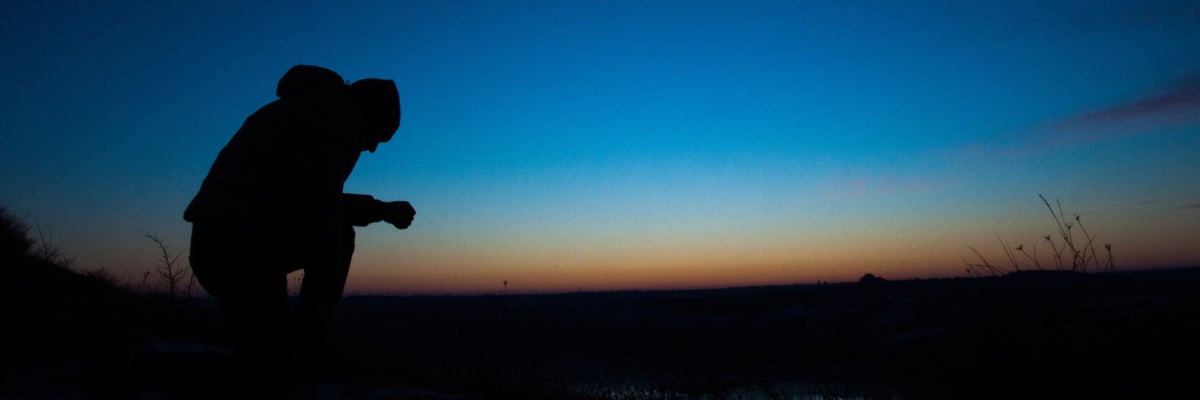
“Death reigned from Adam to Moses” (Rom. 5:14).
Scripture shows this in particularly dramatic form in the first several chapters of Genesis. After Adam and Eve eat the fruit, after their “fall” from grace and expulsion from the Garden, things go from bad to worse to even worse: murder, slavery, sexual violence, you name it. By the time we get to the story of Noah and the Flood, Genesis tells us, “The Lord saw that the wickedness of man was great in the earth, and that every imagination of the thoughts of his heart was only evil continually” (Gen. 6:5).
Many traditional commentaries on the liturgy see the sudden sobriety during Lent of the Roman Rite—the exclusion of both the Alleluia and the Gloria in excelsis—as symbolic of this time between Adam and Moses, when sin reigned. After Moses, at least we have the law—not that we are capable of keeping it—but before Moses, even nature itself is in a way veiled from our eyes. Sin and ignorance form a kind of double blindness.
Blind to the good life, humanity is left with its own disordered desire, summarized in the classic triple threat of lust of the flesh, lust of the eyes, and pride of life (see 1 John 2:15-16). These three temptations represent the threefold movement of humanity in the Garden away from God’s goodness toward the goodness of our own making. In other words, by choosing these other things—what is pleasing to the eye, good to eat, and desirable for personal knowledge or pride—we made for ourselves a world in which we could see nothing else. We chose lesser goods rather than the greater good. And so, as Jesus often says in the Gospels, “we have received our reward.” If you think the greatest things in life are physical pleasures or riches or power, those are the sum total of what you will get out of life. Nothing more is available. But because it is precisely the “more” that we were created for, these lesser things will never truly satisfy.
In the wilderness, Jesus confronts these exact same temptations: lust of the flesh in the offer of bread, lust of the eyes in the offer of worldly power and riches, the pride of life in the selfish use of his authority. Just as in Adam all were tempted and all died, so in Christ all are tempted and made alive. St. Augustine writes, “In Christ you were tempted, because Christ had taken his flesh from you to give you his salvation, his death from you to give you his life, his insults from you to give you his honor, and the temptations from you to give you his victory” (Commentary on Psalm 60).
When we enter Lent, we begin a long anticipation of the great events of Holy Week, the mighty acts by which God accomplished our salvation in Jesus Christ. But this is more than an anticipation, for the mighty acts of salvation at the end of Lent, on Good Friday and Easter Sunday, are the culmination of a whole life lived, a whole life given in humanity to God. To be saved is not just to identify with Christ on the cross; it is to live in Christ in his temptations: to reject with him the world, the flesh, and the devil, and with him to turn in praise and thanksgiving to God.
“The free gift is not like the trespass” (Rom. 5:15). We’d be hard pressed to find a more dramatic understatement in the Bible. St. Paul here represents the beginning of a long line of Christian thinkers who insist that redemption is much more than just the restoration of what was lost: it is something completely new. In this vein, the Easter Exsultet boldly proclaims, “O love, O charity beyond all telling, to ransom a slave you gave away your Son! O truly necessary sin of Adam, destroyed completely by the death of Christ! O happy fault that earned so great, so glorious a Redeemer!”
And so the recollection of our fall in Adam is actually a happy one, even while it is meant to spark our penitence and contrition. For the gift is not like the trespass. It is so much more. Astoundingly, unaccountably more. Earlier, quoting from Genesis, I noted how the “imagination” of man’s heart was only toward evil. Of old, that imagination could lead only to death. Yet in her Magnificat, Our Lady proclaims that God “hath scattered the proud in the imagination of their hearts.” In this new covenant, the wicked imagination is destroyed not by death, but by the conception and birth of a child. The free gift is not like the trespass.
In short, this is why we do Lent. Meditating on our brokenness and mortality, rather than leading us to despair, brings us to hope—for it is just in this brokenness and mortality and corruption that we see the glory and the wonder of Christ’s salvation. It is through entering with him, especially during Lent, into the dark night of temptation and suffering and sacrifice that we can emerge with him to the joy and the wonder of Easter.



